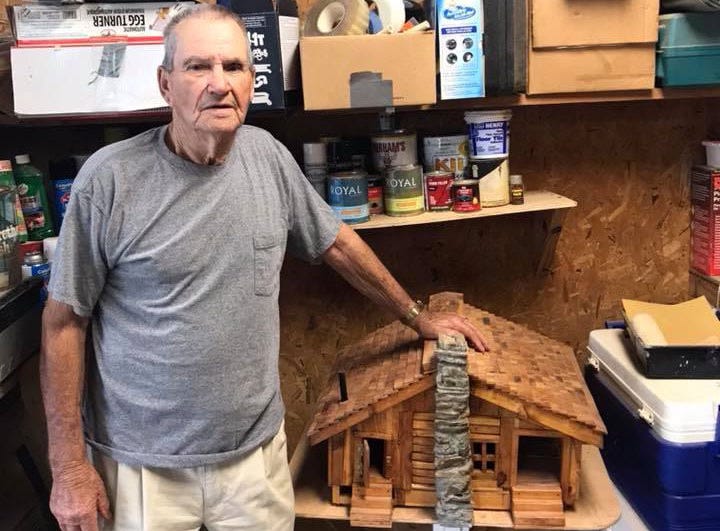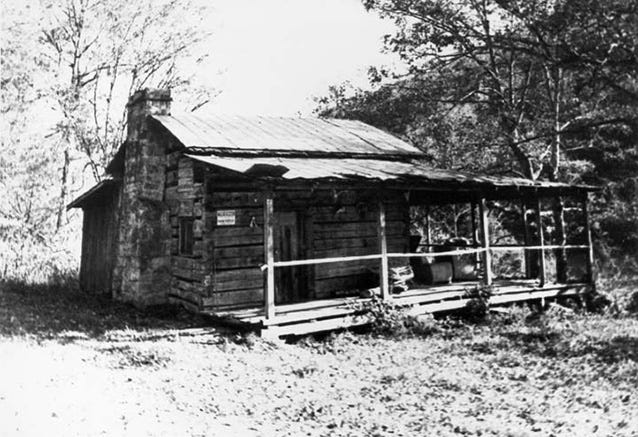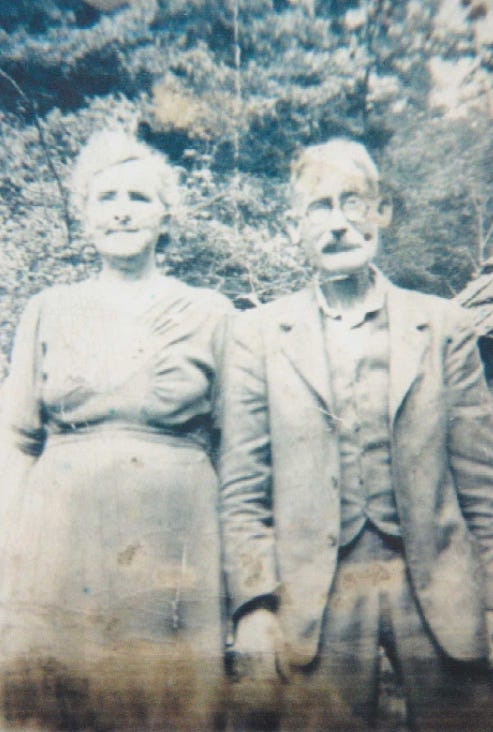
Editor’s Note: Herb King, of Pine Hill, passed away on Wednesday, June 12, 2025. In his honor, here’s a feature story that appeared in the Independent Herald seven years ago, in which King recalled his formative years on the Big South Fork River.
“Now, all is quiet in, and around Parch Corn, except the noise of the river, the stamping of the buck or a chant from some distant point, of an owl — even of an eagle, once in a while. If it were not for these old memories of the past, all, except for the virgin timber that has been removed, would be today as it was when the first white man set eyes on the place.”
H. CLAY SMITH, “DUSTY BITS OF THE FORGOTTEN PAST”
If Herb King had to pick one moment that has made a difference in his life, it would be the moment that his aunt — Cordelia Blevins — rolled up to Kentucky and took him home with her to Parch Corn Creek.
King was seven years old at the time he moved to the Big South Fork River. But he grew up on the river, helping his aunt and uncle farm the rugged bottomland and later graduating the eighth grade at the old school at Station Camp. “I didn’t know where I was going; I had never been down there,” he says of the day his aunt arrived in Pine Knot to pick him up. “(But) that was the best thing that ever happened to me, when she took me down there on that river.”
Today, the old settlements along Station Camp, Parch Corn and No Business in the modern-day Big South Fork National River & Recreation Area are long gone. The homes, barns and outbuildings either collapsed with age or were destroyed. The fields have been reclaimed by nature, reforested by time. If you don’t know where to look, and what to look for, you can hike or ride a horse through what were once thriving communities and not realize what they once were.
King is one of the few remaining former residents of those former Big South Fork settlements. The home he grew up in — the Armstead Blevins cabin at Parch Corn Creek, which was also known locally as the Noble Smith Place — was the last to disappear from the landscape, some 20 years ago. What’s left are the memories of a different era — an era in which a handful of hard-working families settled there, carving out a way of life in the unforgiving Big South Fork River Gorge.
A Depression-Era Tragedy
Born in Kentucky in 1933, Herb King’s early years were spent at his family’s Bear Creek farm, near Paunch Creek, where he was one of six kids. But during the Christmas season in 1937, when King was just four, his father died. His mother was expecting his youngest brother at the time.
“Times were hard back then,” King said. “It was the Depression. There was no food or anything.”
His mother sold the farm and the livestock in an effort to keep the family financially solvent. But within three years, the money from the sale was gone.
“We had a real hard time,” he said. “Us kids were split up. Some went here and some went there.”
King had never met his father’s sister, his aunt Cordelia Blevins — sometimes called Cordie. But on the Fourth of July, she pulled up as he sat playing in the sand as a seven-year-old boy. She took him first to Conatser’s Store, where she purchased him a pair of pants that he still has, and then to her home at Parch Corn Creek.
The Blevins family home at Parch Corn Creek was built in the 1890s by master cabin builder John Litton, whose own home is one of the few still standing within the boundaries of the Big South Fork National River & Recreation Area (it’s accessible via the Litton Farm Loop Trail from Bandy Creek). Armstead Blevins — Cordie’s father-in-law, and the son of Jonathan Blevins, who was one of the first white settlers in the Big South Fork region — paid Litton $5 to build the cabin. Later, Cordie married Jake Darby Blevins, one of Armstead’s 16 children, and the couple settled on the family farm.
It was at Parch Corn Creek that King learned the merits of hard work. Cordie — a “hard-working woman,” King recalls — turned over some of the chores to her nephew. King began milking the cows when he was eight, and fed the cattle and horses every morning and night, before he left for school and after he returned home. Later, he plowed the fields and help take care of the corn. He remembers plowing the bottomland fields along the Big South Fork River upstream from the mouth of Parch Corn Creek, which have since returned to forestland.
King — who will be 85 in a few weeks but doesn’t look much over 70 — never forgot the work ethic instilled in him at that young age. Now living at Pine Hill, where he’s spent the past 47 years, he still grows his own garden each year. “I still have my health,” he said. “I just thank God every day.”

Life on the River
Herb King chuckles as he recalls that while his Aunt Cordie was a hard-working woman, his Uncle Jake Darby sometimes tended to shy away from work in the fields if he could.
“She would get after him about the cornfields and stuff, and he’d always say, ‘Let every day provide for itself,’” King said. “That was his saying.”
Jake Darby was the mail-carrier for the community. He would ride to Oneida once a week to collect the mail and take it back to the Elva post office, which was housed in a store at Station Camp owned by Ike King — who also served as the community’s school teacher, justice of the peace, notary and land agent for the Stearns Coal & Lumber Co.
“Ike was kinda counselor over the entire community,” Herb King said. “He was a strict school teacher, but he was fair, and I liked him a lot.”
In those days, there were a number of families living on the river. About 25-to-30 students attended the one-room school house, which set on the hill on the west side of the river just below the mouth of Station Camp Creek. King recalls surnames like Burke, Watson and Roysden.
“They were good families,” he said. “All of those old houses are gone now.”
The families of the settlement were close. When help was needed, help was given.
“One thing about it — when you got ready to work the cornfields and stuff, you just spread the word and there would be a crowd there to help you,” King said. “Sometimes there would be eight or 10 people hoeing corn while I plowed.”
King would plow his family’s fields, then move up river to Ike King’s farm and stay with the teacher for a week in the spring, plowing the fields there.
Meanwhile, Jake Darby and Cordie had no kids of their own, but Cordie had a heart for children with nowhere to go. In addition to Herb and his brother, Roger, she took in a number of other children. At one point, there were 14 people living in the two-room cabin at Parch Corn Creek.
The cabin had two beds in the living room, and a kitchen. Eventually, a third room was added with two more beds. The floors were made out of hewed logs. Every year, Cordie would get sand and put the family to work scrubbing the logs until they were white. Then the cracks would be filled with clay mud, which served as mortar. It helped keep the cold at bay during the winter, though it was still plenty cold at first light. King recalls waking up and finding the rug in the living room rolled up at the corners from the cold. He would place his feet in the still-warm ashes in the fireplace, seeking out the last remaining warmth from the previous evening’s fire.
Nearby the cabin was a spring, which provided water for the family. Jake Darby and Cordie kept their milk and butter beneath a rock slab at the spring, where the cold water would keep it cool. Men who fished the river would get drinking water from the family’s spring, and “we missed a lot of milk and butter there,” King remembers with a laugh.
Cordie Blevins was such a hard worker that it eventually began to take a toll on her. One day, King and some of the other children found her unconscious by the spring, where she had passed out on her way to the garden.
“It was from over working,” he said. “She just over-worked herself.”
However hard the work may have been, King remembers it as a joyous life.
“I always say it was a wonderful time,” he said. “If I had one place to live and had a way to make a living there, that’s where I’d choose to live — at Parch Corn. I’ve always been a lover of nature.”
School Days
Like his aunt, King was a hard worker. During the winter months, he was paid a nickel a day to make the 1.5-mile walk from Parch Corn to the school at Station Camp to build a fire in the stove. He would also ferry other kids across the river. A Huckeby family lived at Chimney Rock on the east side of the river, and the kids would walk over the hill to the river each morning, where they’d meet King.
“They’d holler and I’d go over in a boat and get them,” he said. “Sometimes the river would be frozen in ice and I’d have to break the ice to get across. And by the time we came back, it’d be frozen back again. But they’d still walk over that hill to go to school.”
There were no “snow days” back then. Missing school wasn’t an option.
“You never missed, it didn’t matter if there was a foot of snow on the ground,” King said. “You just wrapped grass sacks around your feet and tied them and walked to school.”
During the summer, the boys would sometimes slip off from school to swim in the river. Ike King knew something was afoot but couldn’t catch them — until one day he finally did. When he quizzed them about their wet heads, King and his friends told him that they had been playing and were sweating. But that was the end of the swimming days. Ike and the leather strap he kept on hand at the school saw to that.
“When you got three stars on the board next to your name, you had to stay after school, roll up your pants legs, and get that leather strap wrapped around your legs,” King said.
The school was also a church — New Zion Church, it was called. Those were the days of circuit preachers, so there was no services every Sunday. Instead, the preacher — Jake Darby’s nephew — would walk from Alticrest in Fentress County, near the headwaters of Gum Branch, which feeds into Laurel Creek and, eventually, Station Camp Creek, to New Zion once a month. Another preacher would walk from Monticello to Station Camp.
“They’d stay with someone over the weekend, then walk back,” King said. “We didn’t have any money; there wasn’t any money. So we’d give them a ham or something. They’d throw that across their shoulder and carry it home with them.”
Like the rest of the buildings in the settlement, including Ike King’s store, Jake Darby’s cabin and the other homes, the school building is long gone.
Herb’s son, Wayne King, recalls the last time he visited the school, as a youngster in the 1960s.
“The last time I was there, it looked like they had just turned out school and gone off and left it,” he said. “It was made of beautiful knotty pine. The desks were still there. There was even a lesson still on the chalk board. It was a beautiful place.”
Fun and Games
Life on the river wasn’t all work. There was time for play, too. In addition to slipping off to the river to swim on school days, King recalls using a grapevine on the mountainside as a swing — and how it broke when one of his heftier classmates attempted to swing on it, knocking the boy unconscious.
King and his brother were jokesters — a little mischievous, a trait that he said runs in the family. His brother was particularly fond of giving their Uncle Jake Darby a hard time. Among the many pranks that was pulled on the older man was locking him in the family outhouse — which is the only structure that remains today at the Parch Corn Creek farm.
“Uncle Jake always liked me, but I’m not sure he much liked Rog,” King said with a laugh. “He’d pick up rocks and put them in his overalls pocket, and every time he caught Rog out he’d throw one of those rocks at him.”
King remembers those days fondly.
“It was a hard-working life but a wonderful life,” he said. “You didn’t have any worries. The biggest thing you had to worry about was getting out of work. It was peaceful. You didn’t hear all the bad news and stuff.”
End of an Era
Being isolated from the rest of the world was one of the allures of life on the river, as it turned out. But in those days, it didn’t much seem like it sometimes. Getting “to town” could sometimes prove to be an adventure. King recalls riding his horse to Oneida, and how the horse was spooked by a train as he was riding along Main Street. For the most part, though, people who lived along the river had to rely on the one person in the community who had an automobile.
“Everybody had to depend on him because he was the only one with a vehicle,” King said. “We worked sometimes a half day at a time getting off that river and up the mountain. There would be a bunch of us pushing that truck and then riding in the back of it in zero-degree weather.”
Eventually, families began to move out.
“They just started moving away and leaving empty houses,” King said.
Today, Big South Fork interpreters paint a picture of young soldiers returning from World War II in the mid 1940s. They had seen the outside world while in the service, and wanted to leave the isolated river communities once they returned. But King said it was bound to happen, even if not for World War II.
“It was going to happen anyway,” he said. “Everybody just started moving out. There wasn’t too many people left back there then. I guess they just wanted to try to live a better life.”
King left himself in 1949, after 14 years of living on the river. He departed Parch Corn Creek with his mule, a plow and a sled, moving into a house on Grandpappy Lane at the bottom of Dick Smith Hill in Oneida. He still has the turning plow that he used to make a lot of money turning gardens for people in Oneida — that and the memories of a childhood at Parch Corn.
“I thought I was gonna really like it when I got away from there,” he said. “But I didn’t.”
Armstead’s cabin was occupied for another six years by other members of the Blevins family before Noble Smith purchased the farm in the 1950s. He used it as a hunting retreat until the federal government bought the land in the 1970s. In 1998, the Armstead Blevins cabin was the last of the homes in the Station Camp, Parch Corn and No Business settlement when it burned to the ground by a fire left by careless hikers. The chimney still stood until 2017, when it finally collapsed.
It’s been a few years since King was back at the old homeplace. He remembers last visiting the cabin six or seven years ago, while coon-hunting, but time has a way of getting away. His son, Wayne, gently reminds him that the cabin burned in 1998 — twenty years ago.
Still, time can’t erase the memories of a life that was simpler, even if it was harder. When the entire world consisted of fresh-turned cornfields along the banks of Parch Corn Creek and the Big South Fork River, of a one-room school house at Station Camp under the tutelage of Ike King, and of neighbor pitching in to help neighbor.
“You just lived off the land,” King said. “You didn’t depend on anybody. You didn’t have all this news coming in.
“That old place, I loved it. I think more about it now than I did then. It was a joyous life.”



